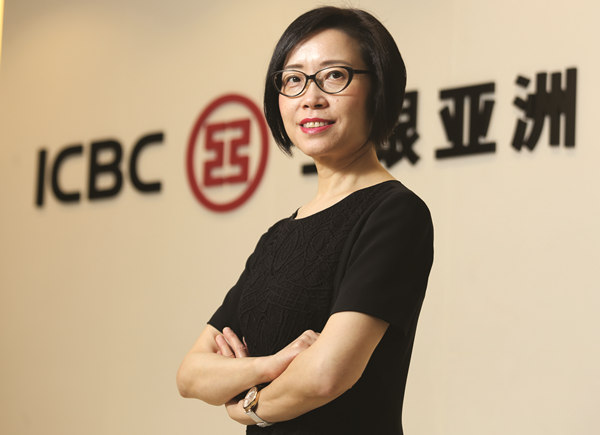Banking it all on the old credentials
 |
|
Gao Ming, chairman of ICBC (Asia), says the group is making big inroads into investment banking with concern of both its longstanding and new customers. PARKER ZHENG / CHINA DAILY |
ICBC (Asia) chief Gao Ming is on a new mission in HK. She tells Evelyn Yu that capturing a broader Asia Pacific market and helping its clients 'go out' shouldn't be a Sisyphean task.
With just eight months at the helm of the overseas flagship unit of one of the Chinese mainland's "Big Four" lenders - the Industrial and Commercial Bank of China (ICBC) - Gao Ming aims to bring back the stewardship and expertise with which she had made her mark during her time as the bank's chief representative in Europe a decade ago.
Gao, who took up the chairmanship of Hong Kong-based ICBC (Asia) in February this year, has now set her sights on capturing a much broader market in the Asia Pacific region in tandem with its clients' going global strategy.
Just days before she came to China Daily's interview, ICBC (Asia) announced its interim results for the first half of this year. Its after-tax net profit went up HK$73 million - 2.07 percent year-on-year - to HK$3.615 billion.
The lender's deposits and loans businesses both saw strong growth during the period, surging by more than HK$60 billion.
Gao's formula is to get the bank adapt itself to the persistent fluctuations in the world financial markets, steering the company away from troubled waters into bigger non-interest-related operations to help it cope with the ever-narrowing net interest margins.
For the 2017 first-half, ICBC (Asia)'s net non-interest income came to HK$1.161 billion, accounting for 20.44 percent of its total operating income.
"We're in the transition from the traditional deposits and loans business; we will strengthen our non-interest operations as the company aims to expand its fee-generating businesses, including advisory, asset investment and investment banking. We seek to raise our non-interest business from 20 percent to 30 percent within three or five years," says Gao.
ICBC (Asia)'s goal to boost its investment banking portfolio, however, seems to overlap that of ICBC International - the investment banking arm of ICBC in Hong Kong. ICBC (Asia) boasts having the financial services license its investment banking counterpart longs to have as a sponsor of initial public offerings.
But, Gao poured scorn on the suggestion that the two entities are duplicating each other's work.
"We're expanding into investment banking with concern of our clients. We want to provide all-round services to our customers, and if our longstanding clients, who have been getting loans from us, have other needs, be them bond issuance, tending to mergers and acquisitions or anything of that sort, we're here to help them out as well."
Shot in the arm
Gao's credentials have come a long way in helping her win greater recognition among Asia's banking circles. Back in 1996, her career got a shot in the arm when she was awarded the honor of the "Best Banking Employee" by the Hong Kong Institute of Bankers - the first banking executive from the Chinese mainland to have racked up the accolade.
ICBC (Asia) embraces the push by prominent mainland business and financial institutions to "go out" - a campaign that has been accentuated by the nation's high-profile, mammoth Belt and Road Initiative.
"We're actually following our clients' steps in our expansion program," explains Gao. "Chinese-funded enterprises do have a high bidding rate in infrastructure projects in the countries associated with the Belt and Road project. We're happy to see many Chinese-funded enterprises having won various projects in places like Austria, New Zealand, Malaysia and Indonesia."
On the heels of a string of high-profile, multibillion-dollar acquisitions by mainland companies, the mainland authorities have moved to put the lid on domestic enterprises' overseas investments in the property, sports, entertainment and other fields.
But, according to Gao, ICBC (Asia) has been less hit by the new regulation as most of its clients are players in the energy, electricity, telecommunication and infrastructure sectors. "Those are industries that serve as pillars of the national economy, they're counter-cyclical and have lower risks."
In April last year, ICBC (Asia) secured the green light from its parent company for its loan business to proceed in the Asia Pacific in addition to Hong Kong and the Chinese mainland. In the first year of its establishment last year, the lender's Asia Pacific division secured loan commitments exceeding HK$20 billion, with a HK$14-billion loans drawdown from clients across the region.
Solid footprint
Allied with its affiliates in the Asia Pacific, Gao says ICBC (Asia) has planted a firm footprint with regard to syndicated loans for major projects. The support it has gained from the parent company - the world's biggest bank in terms of total assets - is ICBC (Asia)'s biggest differentiator among its competitors in Hong Kong, she says.
Its asset management subsidiary, ICBC (Asia) Investment Management Company Ltd, has also seen its assets under management having more than doubled - from HK$20 billion at the beginning of this year to more than HK$50 billion as of August.
"We have six unit trusts authorized by the SFC (Hong Kong's Securities and Futures Commission) - three equity funds, two bond funds and one a balanced fund. We also have a number of discretionary accounts for institutional clients, including QFII/RQFII accounts, QDII accounts, as well as a few private equity funds. The average return of equity units trusts is above 20 percent and 4 percent for bond unit trusts year-to-day."
In her new role, Gao further plans to up the stakes in retail banking in Hong Kong.
"On the mainland, our parent company has 5 million corporate clients and 500 million individual clients. But, in Hong Kong, our market share of retail customers is only in the single digits. We're resolved to lift that to double digits in the short term."
Gao, nevertheless, admits that attaining that target is a challenging, though not an impossible task.
It takes time for a commercial bank to accumulate local customers - a disadvantage compared with some of its rivals, which have been serving Hong Kong for more than a century - she argues.
Gao is very passionate about the vision though. "A commercial bank is an important part of a city. It's closely knit with its citizens' lives and evolves along with the city's change of the times."
Contact the writer at evelyn@chinadailyhk.com
















